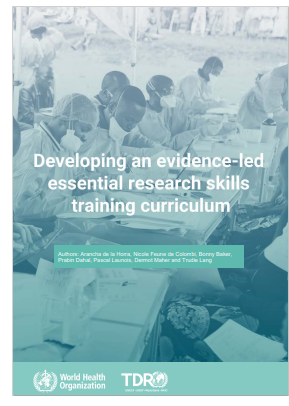There is vast global inequality in where health research takes place, on who leads the research and on who benefits from research data/findings. To address the inequity in research skills, TDR has worked for many years to strengthen the capacity of researchers in low-and middle-income countries (LMICs) to conduct research through training and grants.

Over the last decade or so, TDR has also worked together with the Global Health Network (TGHN) to help develop missing research skills. Both organizations work across all diseases and all types of health research and share many of their goals. The latest curriculum, developed in a collaboration between TDR and TGHN, provides the framework to deliver the full range of knowledge and skills that any team undertaking health research needs to deliver a safe, ethical and accurate study.
“There is a need for health research abilities and activities to be in place in every healthcare setting across the globe,” says Professor Trudie Long, who heads TGHN at Oxford. She adds: “This is critical for tackling any disease, as there is a whole set of unknowns. This is highlighted of course in outbreak situations, when answers are needed ‘immediately’. In the absence of research skills, disease transmission could go unchecked while waiting for skills to ‘arrive’ from elsewhere.”
The study in which the curriculum was rooted helped to identify the minimum set of skills, knowledge and key principles that are needed to enable those with limited or no previous research experience undertake high-quality research for health. For the study, over 7,000 members of TGHN’s community of researchers and healthcare professionals were asked to outline the skills that they currently lack and the skills they believed they needed. These responses were then taken to research organizations for refinement in an iterative process involving the community of researchers and stakeholders. The consensus led to the development of the curriculum’s 13 component modules.
“This curriculum sets out the skills needed for research to tackle all diseases,” says Professor Lang, adding that “the presence of teams in any and every healthcare setting with research skills will help generate evidence to tackle local disease priorities and burdens.”
Speaking on behalf of TDR, Dr Pascal Launois, Acting Head of the Research Capacity Strengthening Unit, stated: “This is an exciting publication for us. It is the first curriculum created to be used whatever the research area, and in all LMICs. Use of this curriculum will increase the research capacity of local teams and will ensure that research is safe and ethical”.
For more information, please contact Dr Pascal Launois

